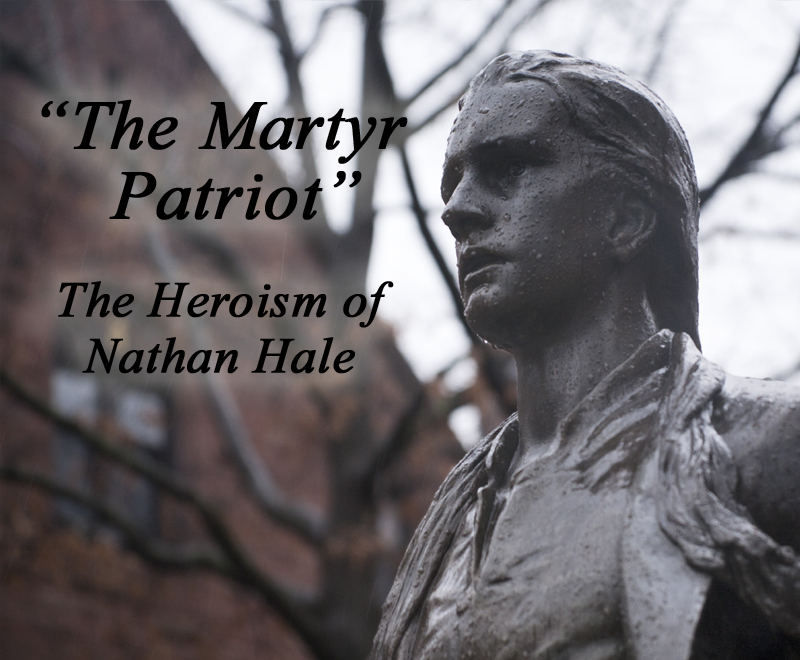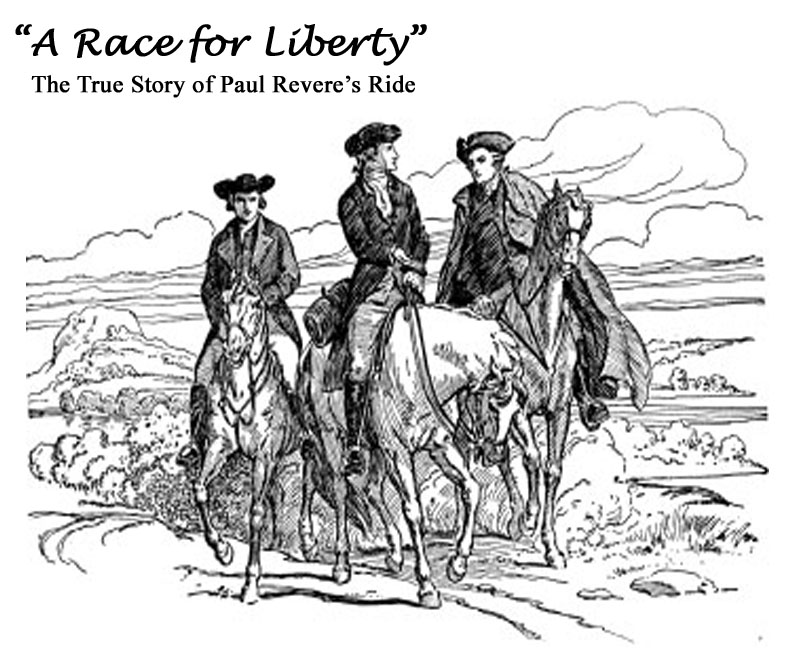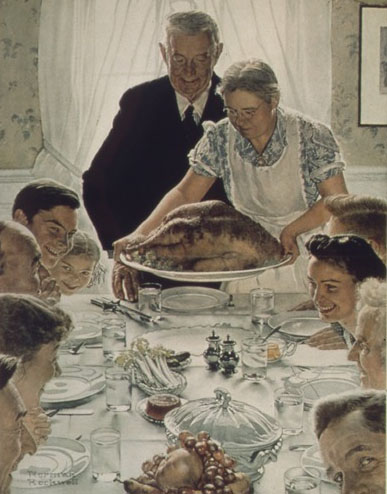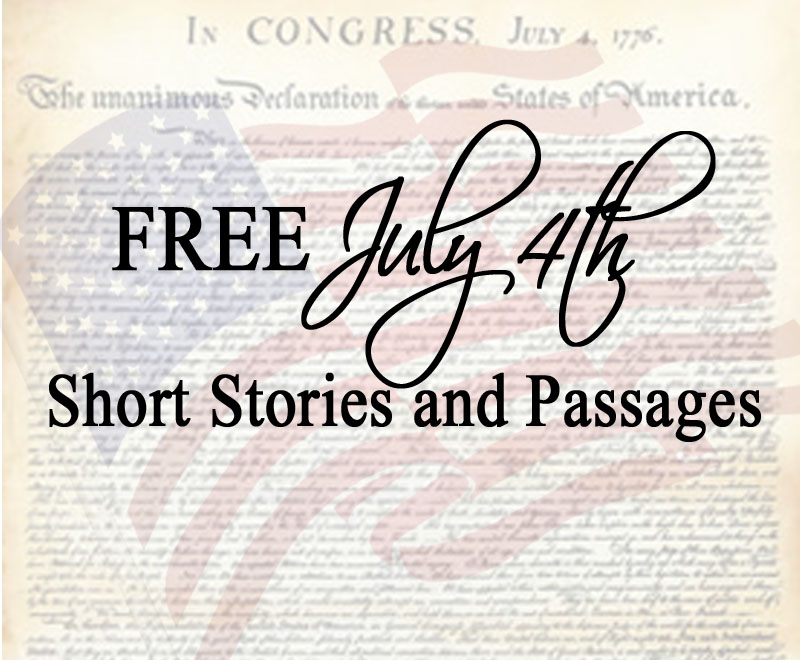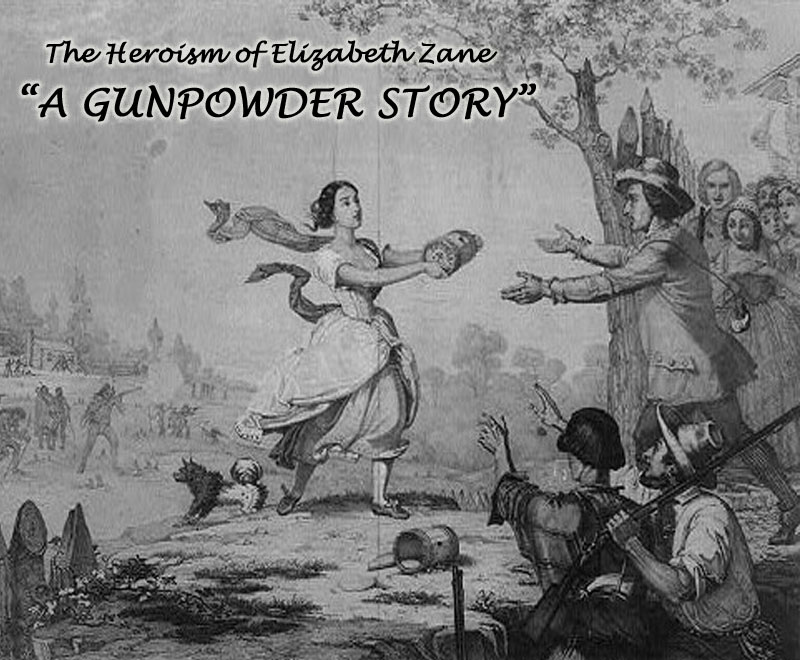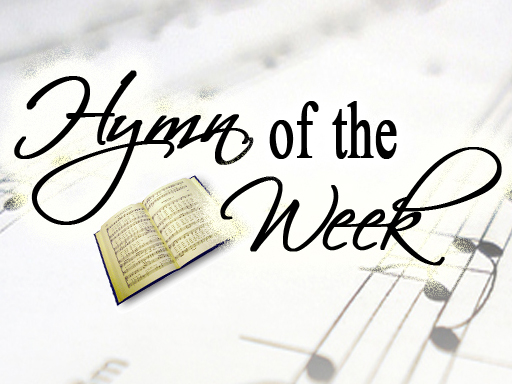“The Martyr Patriot”
The Heroism of Nathan Hale
The Background
The following story is about one of General Washington’s noble soldiers who willingly gave his life in the service of his country. The story is told by Edward Ellis in his book Stories from Patriotism (1918).
The Story
Nathan Hale was born in Connecticut in 1755. He grew up to be a handsome, talented boy, who was not only bright in his studies, but one of the finest athletes in all the country round. He was a swift runner, a fine leaper, and excelled all his playmates in outdoor sports. He was cheerful in his disposition, truthful, and a favorite with all who knew him. He was very much like Washington, and it is no wonder that his friends were proud of him.
When Hale was a boy he was so far along in his studies that he was sent to Yale College. There he was popular with the teachers and students, for he was manly and noble in all that he did. You know that Yale College, like other high schools of its kind, gives much attention to athletics. If they had had a champion football team in those days, I am sure that Nathan Hale would have been among their star players. One day there was a jumping match on the New Haven Green. The young men were skillful at that, and many of them made much longer leaps than you or I can make to-day. When it came Hale’s turn to try, he caused every eye to open in astonishment, for as he sprang from the ground he seemed to go sailing through the air like a bird. When he struck the earth he was so far in advance of all the others that they clapped their hands with delight. Nothing of the kind was ever seen before, and no one tried to see what he could do after Hale made that tremendous leap. His friends were so pleased that they marked the spot where he left the ground and where he came down. Then they put a fence around it to prevent the marks from being rubbed out. That fence stood for many years. When some student began to boast of what he could do in the way of jumping, the others would take him to the spot and point out what Nathan Hale did when he was a student at Yale.
” Suppose you begin with that,” they would say to the ambitious athlete, who, after measuring the length with his eye, would shake his head and walk away. He knew he never could perform a feat like that, and so he said no more about it.
Hale was graduated from college with high honors and everybody wished him well. He was poor and began teaching school at New London, and was there when news came of the battle of Lexington. He was scarcely twenty years old, but his whole soul glowed with patriotism. He had intended to become a minister, but he felt now that his duty was to serve his country. He gave up his school at once and went around among his friends, asking them to join him in going to the help of the patriots. A good many did so, and the next day the little company were marching as rapidly as they could to Boston. He was so bright and devoted to his work that as soon as they arrived Nathan was made a lieutenant. He was set to work guarding the seacoast near New London, but after a time was sent to Boston again, where he was with Washington during the siege of that town. He made so fine an officer and was so well liked by his men that he became a captain.
There was no company in the whole army that showed finer drill and discipline than Captain Hale’s. When the term for which his men had enlisted had ended, he offered to give them all his own pay if they would reenlist. They did so, for they loved their brave captain and knew that he was not afraid of any danger.
One night in the spring of 1776, Captain Hale picked out a number of his most daring men and rowed out in a boat to where a British vessel was anchored within a few yards of a powerful frigate. Climbing quickly and silently upon the deck they took the whole crew prisoners, shut them in the hold, and then brought the vessel to the wharf without any one of the enemy suspecting what was going on.
If you will study the history of your country, you will learn that the summer of 1776 was one of gloom and almost despair to the Americans. I have told you how everything seemed to go wrong with the patriots until Washington made his brilliant capture of the Hessians at the close of the year at Trenton. The Americans had suffered a bad defeat on Long Island in August, and only by a narrow chance did the main army manage to escape to Manhattan Island. The British forces were almost double in number and near at hand, eager to attack the Americans, while a fleet of their warships were in New York Bay. It was a sad time, indeed, and had any one but Washington been at the head of the patriot army, it would have been captured.
As it was, Washington felt that he must find out in some way what the enemy meant to do, how many troops it had and how they were placed. There was only one way of getting this knowledge, and that was by sending a spy into the British lines.
You may know that the most dangerous thing a soldier can do is to act as a spy. While he keeps on his uniform and fights in the ranks, if he has the bad fortune to be made a prisoner, his life is in no danger. He may be kept for a good while, but no civilized nation ever harms a prisoner who has been captured in a fair fight.
But it is different with a spy. He does not wear his uniform, but pretends to belong to the enemy’s side, or at least is friendly to it. He tries to move about and learn all he can, and then he waits for a chance to slip away and take the news to his own commander. You can see how valuable such knowledge is, for it may give his friends the chance to win a great victory. So it is that spies are looked upon as so dangerous, that if they are caught, they are always hanged or shot. Major Andre, a British spy, was captured within our lines and hanged. All nations follow that course.
You will understand from this that a man must be very brave to play the spy. He must be cool and cautious, for he knows that if he is found out, nothing can save him from the most disgraceful of deaths.
A large number of men in Washington’s army were asked to go into the British lines, but every one of them said no — the risk was too great. At last, when it looked as if no one could be persuaded, the matter was named to Captain Hale.
“I’ll go,” he said promptly; “I will take any risk for Washington and my country; I am ready to start at once.”
Hale went before Washington and told him this. That great man looked admiringly upon the brave, handsome youth and reminded him of the dreadful danger which hung over him.
” I have thought of all that,” said Hale, with a smile, “and am ready to receive my instructions from Your Excellency.”
Washington had not many to give. He told Hale that he wished him to learn all he could about the number of troops under Howe, the British commander, where they were placed, and what that leader intended to do. As to how the young officer was to learn this, he must settle for himself.
Bidding good-bye to Washington, who took his hand and gave him his best wishes, Captain Hale dressed himself up as a school-teacher. He could do that very well, for, as you know, he had been a teacher. It was at Norwalk that he made this change, leaving his uniform there, while he put on a brown suit and a broad-brimmed hat. Then he went aboard of a sloop late at night, and was landed at Great Neck Point on Huntingdon Bay. He stayed all day and night with a farmer, who was his friend, and the next day boldly walked into the enemy’s lines.
I wish I could tell you all that Captain Hale, disguised as a Quaker school-teacher, did in the next two weeks, but nobody has ever been able to find out. He spent the whole time with the enemy and must have played his part well, for no one suspected him. He went from place to place, talked with soldiers and officers, studied the plans of the British general, and did not think of leaving until he had learned all that he wanted. He did not trust his memory, but put it down on paper, which he let no one see.
It is known that he visited all the British encampments near Brooklyn, and that he passed the enemy’s lines twice. Finally, at the end of two weeks, he felt that he knew all that was necessary. It was most valuable information, and would be of great help to Washington, who was anxiously waiting for his return. Still no one suspected the sober, silent Quaker schoolmaster, and he crossed over from New York to Brooklyn, where he was still in the enemy’s lines, Cool, brave, and careful he made his way to Huntingdon.
Captain Hale was now close to his friends. A little farther and he would be safe. There a boat was to come for him and take him across the water to the American lines, where his perils would be at an end.
There was a little tavern at Huntingdon, into which he walked and sat down to wait until his comrades came for him. While he was there a man came in and looked closely at him. Hale did not notice him, and it is a great pity that he did not, for he was a Tory and a relative of Hale. He recognized the spy and, slipping out of the tavern, hurried with the news to a British naval officer, whose vessel lay near by.
Meanwhile, Hale, who was watching for the boat to come for him, thought he saw it approaching and walked down to the Point to meet it. With no thought of anything wrong, he took several steps out into the water to leap into the boat, but, as he was about to do so, the men suddenly leveled their guns and ordered him to surrender. Seeing he had been betrayed, he turned again and started to run up the bank, but the soldiers called again to him to surrender. He looked around, and saw that he would be shot dead the next instant if he did not obey. So he turned about and again walked down the bank and stepped into the boat belonging to his enemies. He was rowed out to the ship Halifax and there searched. No papers were discovered about his clothing, but knowing how careful spies are to hide their secrets, the officer took off his shoes and pried the soles apart. There the documents were found which proved Nathan Hale to be a spy.
The prisoner scorned to make any denial, and was taken to New York, where he was brought into the presence of Lord Howe, who examined the papers.
“Who are you?” asked the British general.
“Captain Nathan Hale, of the Continental army,” was the prompt reply.
“You have been within our lines seeking information?”
“I have, sir.”
“And you seem to have obtained it,” grimly added Howe, looking again at the papers.
“Yes; I was quite successful, and am sorry that I could not place those in the hands of General Washington.”
“No doubt; and you are aware also of the punishment which all nations visit upon spies? ”
The prisoner bowed his head, as he replied:
“I am, sir; and I do not ask for a court martial. I am ready for whatever you deem right to do with me.”
Lord Howe could not help admiring this brave patriot, who, without any boasting in his manner, confessed he was a spy and asked for no mercy. He would have been glad to spare him, but that could not be. He ordered him to be hanged the next morning, and turned him over to William Cunningham, who was Provost Marshal of the British army in New York.
Captain Hale was led to the gallows the next morning and, turning to the bystanders, whose eyes were filled with tears, said: —
“My only regret is that I have but one life to give to my country.”
“Swing him off! swing off the rebel!” commanded Cunningham.
And so one of the bravest and purest patriots that ever lived died the death of a martyr for his native land.
Another sad fact about the death of Hale is that to this day no one knows where his body was buried. How gladly we would raise a monument over his grave if we knew where to build it. It is thought that it was dug beneath the gallows, but it was never marked and the truth can never be known.
The 25th of November, 1893, was crisp and cold. On that day thousands of people gathered in City Hall Park, New York, where a statue of Captain Nathan Hale was unveiled. It is an impressive figure, showing the martyr patriot with the thongs upon him, and with an expression of calm nobility and dauntless courage on his countenance.
This page was created by:

Back to main July 4th Stories page.
We welcome your ideas! If you have suggestions on how to improve this page, please contact us.
You may freely use this content if you cite the source and/or link back to this page.
